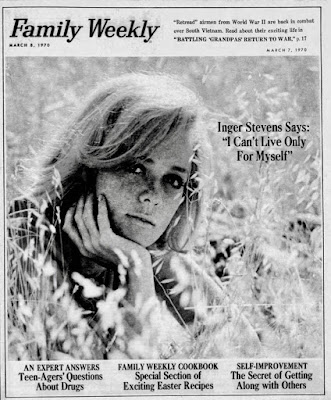I knew that an article about Inger appeared in the March 8, 1970 issue of Family Weekly, an insert published in newspapers across the country, and have even shared some quotes from it here before; however, I did not realize that Inger was the insert's cover girl until I saw the cover for the first time this week.
At that moment, it seemed the only thing left to do with my life. I'd taken a good look at the people around me and at myself. And all I saw was emptiness. I sat in my little apartment and stared at the walls. How desperately I wanted to talk to someone! Only there was no one.
Inger discusses how she found new meaning in helping others and taking the focus off herself. When asked if being a star is important to her, Inger replies, "I don't even know what the word means and I could care less." She did, however, care about others and helping them in a meaningful way. The writer relates how Inger supported a stunt man when he was due to lose wages. As filming was taking place in Mexico (both Mask of Sheba and Five Card Stud were filmed in Mexico), the stuntman had to return to the U.S. where his wife and baby were in a hospital. Inger made sure that the man had money to travel home and that he would be paid a salary while he was away from the set.
What work gave Inger the most pride and fulfillment? Not a certain movie role or piece of art or romantic relationship. No, it is her work on the Neuropsychiatric Institute of UCLA Medical Center's advisory board and her role as active chairman of the California Council for Mentally Retarded Children that fills Inger with pride in March 1970. She spends any free time she has at Kedren Community Health Center, "founded October 22, 1965 by the late Dr. James L. Jones, MD, a child psychiatrist...after the Los Angeles Watts uprising in response to economic disenfranchisement, education deprivation, and minimal or no access to healthcare."
When the writer praises her for the commitment she's made to underserved, developmentally delayed children, Inger's face lights up and she responds, "It is nothing compared to what they have given me! I am happy doing for others. I wake up every day to see it."
Sources:
Oppenheimer, Peer J. "Inger Stevens Says: 'I Can't Live Only for Myself.'" Family Weekly. March 8, 1970.
"Our History." Kedren Health. https://www.kedren.org/about/our-history/


No comments:
Post a Comment